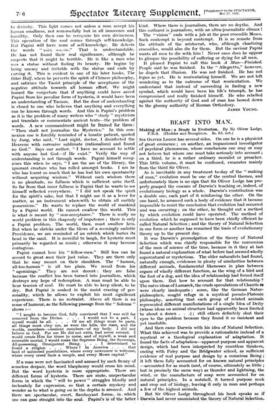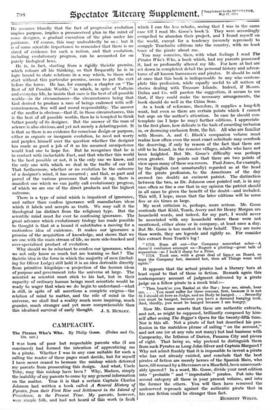BEAST INTO MAN.
Making of Man : a Study in Evolution. By Sir Oliver Lodge, F.R.S. (Hodder and Stoughton. 3s. Sd. net.)
Sin. OuvEn LODGE has several sides. On one he is a physicist of great eminence ; on another, an impassioned investigator of psychical phenomena, whose conclusions one may or may not believe but whom one must take seriously into account ; on a third, he is a rather ordinary moralist or preacher. This little volume, it must be confessed, emanates mainly from the third Sir Oliver.
As is inevitable in any treatment to-day of the " making of man," evolution must be one of the central themes, and unfortunately there is no sign that Sir Oliver Lodge has pro- perly grasped the essence of Darwin's teaching or, indeed, of evolutionary biology as a whole. Darwin's contribution was a double one, each part of it reinforcing the other. On the one hand, he amassed such a body of evidence that it became impossible to resist the conclusion that evolution had occurred and was occurring ; on the other, he thought out a method by which evolution could have operated. The method of evolution which he supposed to have been chiefly efficient he called Natural Selection ; and the theory of Natural Selection in one form or another has remained the basis of evolutionary theory up to the present day.
It was Darwin's promulgation of the theory of Natural Selection which was chiefly responsible for the conversion of the men of science of the time, because in it they at last found a natural explanation of what before had seemed wholly supernatural or mysterious. The older naturalists had found, naturally enough, evidences in plenty of similarities between different animals, fundamental likenesses in plan between organs of wholly different function, as the wing of a bird and the foot of a dog, and the idea of relationship had forced itself upon them. But how to account for that relationship ? The naive ideas of Lamarck, the crude speculations of Chambers were clearly inadequate : some, like the German Natur- philosophen, sought refuge in a mystical pseudo-Platonic philosophy, asserting that each group of related animals represented different manifestations of a single Idea of Deity (whose ideas on animal structure had apparently been limited to about a dozen . . .) ; still others definitely shut their eyes to the problem because they found it so insistent and yet insoluble.
And then came Darwin with his idea of Natural Selection. What this achieved was to provide a rationalistic instead of a mystical or a theological explanation of adaptation. It found the facts of adaptation—apparent purpose and apparent design, which had been interpreted by countless thinkers, ending with Paley and the Bridgwater school, as sufficient evidence of real purpose and design by a conscious Being ; it left them fully accounted for on known natural principles —accounted for as much (and, of course, ultimately as little ; but in precisely the same way) as thunder and lightning, the wind, or the manufacture of soap were accounted for on natural principles. In a nutshell, it turned purpose neck and crop out of biology, leaving- it only in man and perhaps a few of the highest animals.
But Sir Oliver Lodge throughout his book speaks as if Darwin had never enunciated the theory of Natural Selection. He assumes blandly that the fact of progressive evolution implies purpose, implies a preconceived plan in the mind of some designer, a gradual execution of the plan under his guidance. Of course, this may undoubtedly be so ; but it is of some scientific importance to remember that there is no shred of evidence for such a notion, and that evolution, including evolutionary progress, can be accounted for on purely biological laws.
He is, in fact, starting from a rigidly theistic premiss, which colours all his thinking, so that frequently he is in logic bound to state relations in a way which, to those who start without this particular premiss, seems to put the cart before the horse. He has, for example, a chapter on " The Best of All Possible Worlds," in which, in spite of Voltaire and everyday life, he insists that ours is the best of all possible worlds—in the circumstances—the circumstances being that God desired to produce a race of beings endowed with self- consciousness, free will and moral responsibility. The answer of the scoffer is obvious—that if, in those circumstances, this is the best of all possible worlds, then he is tempted to think rather poorly of its designer. But the answer of the man of science is also obvious, and yet not merely a debating point. It is that as there is no evidence for conscious design or purpose, either in organic or inorganic evolution, he need not worry and perplex himself over the question whether the designer has made as good a job of it as his assumed omnipotence would lead one to hope for. But he recognizes that he is in contact with ineluctable Fact, and that whether this world be the best possible or not, it is the only one we know, and the only one with which we deal in the traffic of our life That furthermore, whether or no evolution be the outcome of a designer's mind, it has occurred ; and that, as part and parcel of the various processes that make it up, there is manifest one which we can justly call evolutionary progress, of which we are one of the direct products and the highest outcome.
There is a type of mind which is impatient of ignorance, and rather than confess ignorance will manufacture ideas which it labels and accepts as truth. We may call it the theological (as distinct from the religious) type. But the scientific mind must for ever be confessing ignorance. The great advance which evolutionary biology has made possible to thought is that at a bound it substitutes a moving for a motionless idea of existence. It makes our ignorance a promise of the acquisition of knowledge, and shows that we are one with the main stream of life, no mere side-tracked and over-specialized product of evolution.
Why should we be reluctant to confess our ignorance, when we not only know so much but are learning so fast ? The theistic idea in the form in which the majority of men (includ-
ing Sir Oliver Lodge) still hold it is an idea derivable directly from primitive kingships—a projection of the human ideas of purpose and government into the universe at large. The scientist as scientist must stick to his last, but in their capacity of ordinary human beings most scientists would be ready to wager that when we do begin to understand—what is still, in spite of all assertions a complete enigma—the relation of mind to matter, and the role of mind in the universe, we shall find a reality much more inspiring, much grander, much stranger and yet more comprehensible than this idealized survival of early thought. J. S. Hummy.



















































 Previous page
Previous page